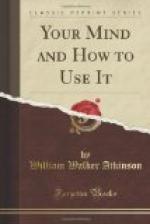2. Observe the author’s name. If you are to use his book frequently, discover his position in the field. Remember, you are going to accept him as authority, and you should know his status. You may be told this on the title-page, or you may have to consult Who’s Who, or the biographical dictionary.
3. Glance over the preface. Under some circumstances you should read it carefully. If you are going to refer to the book very often, make friends with the author; let him introduce himself to you; this he will do in the preface. Observe the date of publication, also, in order to get an idea as to the recency of the material.
4. Glance over the table of contents. If you are very familiar with the field, and the table of contents is outlined in detail, you might advantageously study it and dispense with reading the book. On the other hand, if you are going to consult the book only briefly, you might find it necessary to study the table of contents in order to see the relation of the part you read to the entire work.
5. Use the index intelligently; it may save you much time.
You will have much to do throughout your college course with the making of bibliographies, that is, with the compilation of lists of books bearing upon special topics. You may have bibliographies given you in some of your courses, or you may be asked to compile your own. Under all circumstances, prepare them with the greatest care. Be scrupulous in giving references. There is a standard form for referring to books and periodicals, as follows:
C.R. Henderson, Industrial Insurance (2d ed.; Chicago: The University of Chicago Press, 1912), p. 321.
S.I. Curtis, “The Place of Sacrifice,” Biblical World, Vol. XXI (1902), p. 248 ff.
Laboratory notes.—The form for laboratory notes varies with the science and is usually prescribed by the instructor. Reports of experiments are usually written up in the order: Object, Apparatus, Method, Results, Conclusions. When detailed instructions are given by the instructor, follow them accurately. Pay special attention to neatness. Instructors say that the greatest fault with laboratory note-books is lack of neatness. This reacts upon the instructor, causing him much trouble in correcting the note-book. The resulting annoyance frequently prejudices him, against his will, against the student. It is safe to assert that you will materially increase your chances of a good grade in a laboratory course by the preparation of a neat note-book.
The key-note of the twentieth century is economy, the tendency in all lines being toward the elimination of waste. College students should adopt this aim in the regulation of their study affairs, and there is much opportunity for applying it in note-taking. So far, the discussion has had to do with the content of the note-book, but its form is equally important. Much may be done by utilization of mechanical devices to save time and energy.




